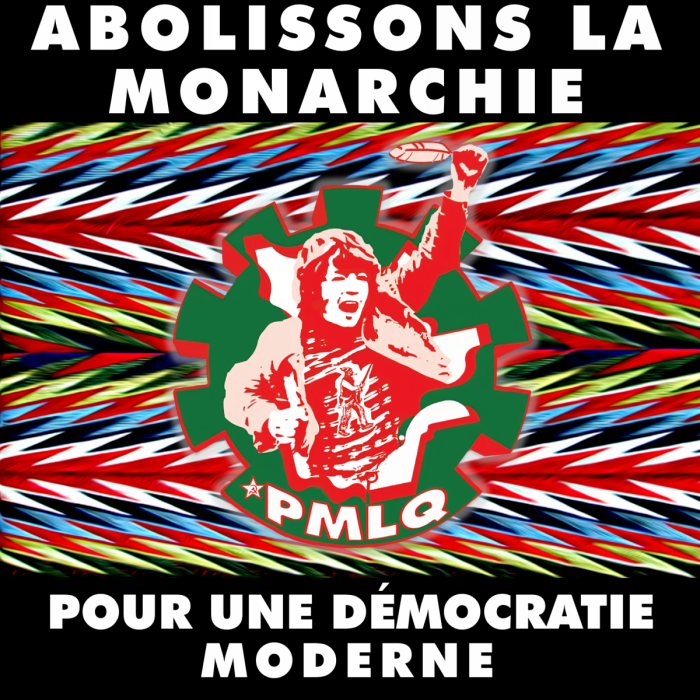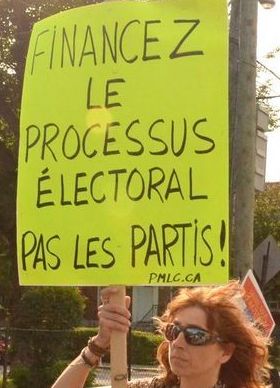Interview with Leaders of the Marxist-Leninist Party of Quebec
On Democracy and the Constitution
The following interview with Christine Dandenault, Leader of the Marxist-Leninist Party of Quebec (PMLQ), and Geneviève Royer, director, were conducted by the Alliance for a Quebec Citizens' Assembly (ACCQ).
Alliance for a Quebec Citizens' Assembly: What is your definition of democracy?
Answer: First of all, I'd like to thank the ACCQ for this initiative of doing interviews on democracy and the constitution, and for the work you're doing. Creating the space for discussion, gathering points of view and bringing this discussion into the public arena is very valuable.
 For our party,
establishing a modern democracy means abolishing the monarchy. A modern
democracy is one that vests the people themselves, and not the
representatives of the rich, with the sovereign power to govern and
decide on all matters that concern them, including the direction of the
economy.
For our party,
establishing a modern democracy means abolishing the monarchy. A modern
democracy is one that vests the people themselves, and not the
representatives of the rich, with the sovereign power to govern and
decide on all matters that concern them, including the direction of the
economy.
Democracy today is in crisis, and the constitution is totally outdated. This was clearly exposed with the death of Queen Elizabeth II, and even more so with the coronation of Charles III. No one could turn a blind eye to the fact that Canada is a constitutional monarchy, that Trudeau applauded the new monarch, his sovereign, and that it's not just a symbol!
It is "the people" who must define "the people", not the state, established by the British Empire of old, perpetuated by those who benefit from the structures of power and privilege it established.
Last fall, the Parti Québécois' refusal to pledge allegiance to the British monarchy was widely supported by the population. It was a step forward. This British monarchy is not only an archaic, outdated and retrograde relic of another era, it is also the concrete expression of the fact that the sovereignty of the Quebec nation, the First Nations and the Canadian people is denied by the British North America Act (BNAA).
ACCQ: In your opinion, what are the causes of the population's loss of confidence in political institutions?
Answer: The main cause is people's experience that all the parties in the National Assembly are defending the same arrangements that exclude them from power. Even if the parties have differences here and there in their respective programs, they are unanimous in refusing to renew the decision-making process so that it is in the hands of the people.
Every day, we hear these parties claim to represent the people of Quebec, while their views and demands for change are totally absent.
Just think of what the right to vote represents today. It doesn't mean much anymore, because it gives no power over decision-making. It doesn't change the direction of the economy. It doesn't change the way governments implement the neo-liberal, anti-social agenda of paying the rich. It only allows us to vote once every 4 years to hand over to others the power to decide, in our name, for a program that attacks individuals and collectives and serves a small minority. So, of course, there's a loss of confidence.
ACCQ: In discussions about a new constitution, a question often comes up about the accountability of elected politicians in relation to their electoral commitments. Where do you stand?
Answer: This year is the 32nd anniversary of the last official reports on the general political disaffection and dissatisfaction of Canadians with the disempowering electoral process. The Spicer Commission on Canada's Future presented its findings to the Mulroney Conservative cabinet in June 1991. The Royal Commission on Electoral Reform and Party Financing followed, presenting its report and recommendations in November 1991. Both commissions reported on citizens' dissatisfaction with politicians, political parties and Parliament. Citizens called for an end to the concentration of decision-making power in the hands of a few. Many people submitted proposals to the commissions for a constituent assembly that would allow the people to draft and approve their own constitution and electoral law.
 More recently in
Quebec, the loss of voter confidence in institutions was raised
following the revelations of the Gomery Commission on the sponsorship
scandal in 2004, among others, during the revelations of the
Charbonneau Commission in 2015. Since then, legislation has been passed
on political financing, among other things. They have not given
democratic institutions any credibility. Quite the contrary, in fact.
The more the proposed changes tighten the state's grip on political
parties, the more they become appendages of the state, undermining the
right of association, the right to conscience, the right to an informed
vote, the right to elect and be elected and the right to participate in
citizen governance.
More recently in
Quebec, the loss of voter confidence in institutions was raised
following the revelations of the Gomery Commission on the sponsorship
scandal in 2004, among others, during the revelations of the
Charbonneau Commission in 2015. Since then, legislation has been passed
on political financing, among other things. They have not given
democratic institutions any credibility. Quite the contrary, in fact.
The more the proposed changes tighten the state's grip on political
parties, the more they become appendages of the state, undermining the
right of association, the right to conscience, the right to an informed
vote, the right to elect and be elected and the right to participate in
citizen governance.
So we say that this process must be modernized so that it is the citizens who choose the candidates, who themselves define the government's program on the basis of defending the rights of all, and so that the financing of political life is assured by public funds – financing the process, not the parties, etc.
ACCQ: Do you recognize the influence of lobbies on politicians?
Answer: Lobbies and the policies that surround them are an admission that the direction of the economy is in the hands of large private interests. This is corruption at its core, and in the name of transparency, the laws and regulations governing lobbying simply make this corruption legal.
Today, we are witnessing supranational bodies deciding what policies governments should follow in order to pay the rich. This means the privatization of politics. It's the direct takeover of government and state functions by narrow private interests.
In practice, the governments of Canada and the provinces, including Quebec, are integrating the country's resources into the U.S. war machine and its economy. For example, NATO dictates an increase to Canada's military spending. Meanwhile, Canada creates anti-China hysteria about alleged Chinese espionage and interference, but has no problem with the domination of Canada by the U.S. war economy, against the people's interests. This shows that there are great contradictions within these bodies, and it's very dangerous for the people of Quebec and Canada.
ACCQ: What do you think of the influence of supra-governmental networks (UN, WHO, UNESCO, etc.) on our policies?
Answer: The UN was founded in San Francisco on October 24, 1945 to prevent another conflict like the Second World War. When it was founded, it had 51 member states; it now has 193. Today, the UN needs major reforms if it is to fulfill its peace mandate. Instead, the Security Council is subject to intimidation and blackmail by the major powers, and fails to defend the rights of the world's countries and peoples, large and small. This is why it must be reformed to realize the principles of its Charter, which oppose aggression and interference in the affairs of member states, and affirm the rights of all nations.
ACCQ: What are your proposals for reducing the impact of lobbies?
Answer: We'll put an end to corruption by taking steps to affirm, not deny, freedom of association, the right to conscience, the right to an informed vote, the right to elect and be elected, the right to participate directly in governance.
ACCQ: Could randomly selected citizens' committees help to reduce conflicts of interest on the part of those in power?
Answer: On the face of it, any new political process is positive in the sense of giving people a new experience in exercising democracy. Your concern to form citizens' committees is interesting because we need to find new ways of doing things today, new forms that will change the situation. We need reforms that will empower the body politic to participate in political life. The political system is organized to keep citizens on the margins of decision-making, as spectators and voting cattle. The marginalization of voters, the body politic and their concerns in elections and in everyday life is a crucial problem to be solved.
 One of the
measures to be taken is for the state to fund the electoral process 100
per cent, not the parties. Today's reality is that the state finances
political parties to the tune of 90 per cent with public funds. The
pretext is given that this is to combat corruption and provide
transparency. But in fact, it's a corrupt mechanism, because political
parties are private entities that should be financed by their members,
not the state.
One of the
measures to be taken is for the state to fund the electoral process 100
per cent, not the parties. Today's reality is that the state finances
political parties to the tune of 90 per cent with public funds. The
pretext is given that this is to combat corruption and provide
transparency. But in fact, it's a corrupt mechanism, because political
parties are private entities that should be financed by their members,
not the state.
Public funds should be used to encourage the electorate to participate in politics, to provide them with the names of all the candidates and their programs, and all kinds of other initiatives so that people can decide for themselves.
ACCQ: How much of a problem is polarization in our society?
Answer: Division is the very basis of the BNAA, which is called the Constitution of Canada: divisions between founding peoples and Aboriginals, between Quebec and the rest of Canada, between workers and newcomers, etc. These divisions are designed, among other things, to stifle public opinion, which considers that everyone has equal rights and that this must be reflected in Canada's Constitution.
It serves to keep the people out of power, whereas today the solution lies in creating new forms and content that empower the people to govern and decide. Society, with its many human relationships, is the basis of the state, not the other way round. The constitution does not define democracy, nor does the state apparatus it puts in place. On the contrary, society and its relationships do. Changing these power relationships is an integral part of achieving change that benefits the people.
Quebeckers need to be able to develop modern, human-centred social relationships with each other and with humanity as a whole.
ACCQ: What issues do you think could be removed from partisanship?
Answer: The Larousse Dictionary gives the following definition of partisanship: "In Quebec, the attitude of a person who shows an exclusive attachment to a political party and a biased point of view in its favour."
Being partisan does not necessarily mean partisanship for a political party. Being partisan means defending causes that seem important to us. For example, we've just been through a period of the pandemic when governments in particular proceeded by ministerial decrees in the health field. This had a huge impact on the resignation of thousands of nurses. When elections came around, the only way they could make their claims heard was to join a political party or candidate. They were told: you have to set yourself up as a third party, obtain authorization from Elections Québec with a lot of limitations.
An election should be an opportunity for everyone to participate in the discussion based on people's claims. Elections don't allow this. Only the parties have the upper hand. In our opinion, we need to encourage greater citizen participation and, even within the Election Act, find every opportunity for people to speak for themselves, in their own name. This will help democracy.
ACCQ: How can government transparency be improved?
Answer: Transparency is a fraud if it is not associated with accountability to the public or to the collectives affected by the decisions made.
Today, the more governments talk about transparency, the more we should be wary of it, because it means that the more decisions are made behind closed doors.
In the name of transparency, Elections Québec demands the names of party contributors and all information about them, to determine whether it was really they who gave the money or someone else. Freedom of association, which is a matter of individual conscience, has become a matter controlled by the state.
In the name of transparency, during its first mandate, the Legault government boasted of publishing its daily agenda and those of its ministers. It makes no difference where and when ministers are if we have no control over the deals they make with private interests or the decisions they take with impunity!
ACCQ: In what way are political parties more competent than the people to organize their destiny?
Answer: Popular wisdom says the opposite! The people have contempt for the big parties that speak on their behalf for a different agenda. The old politics of promises and privileges are not popular at all!
At election time, for example, state-funded political parties, PR and marketing firms, neo-liberal think tanks and the biggest monopolies and cartels control the choice of candidates and decide which issues should dominate the election and the mass media. In the electoral process itself and the mass media, the body politic and its collectives play no role in deciding what the official issues are and what an elected government must do to fulfill its social responsibilities to the people and society, and be held to account if it fails to do so.
A political party, like any institution, must respond to the demands of the 21st century, where the people must exercise sovereignty in everything. Because it organizes workers and the people to exercise power, and dedicates its resources to this purpose, the population will recognize its usefulness and relevance. This is our opinion.
 Our party has been in existence
for 34 years. We do not consider ourselves more competent than the
people. We're an organized force whose job is to play our part in the
battle for the working class to become the nation and vest the people
with sovereign power. It's up to workers and young people to find a
path for Quebec and Canada, to find out where their future lies in the
world of today and tomorrow, and our Party is dedicated to playing its
part in that direction.
Our party has been in existence
for 34 years. We do not consider ourselves more competent than the
people. We're an organized force whose job is to play our part in the
battle for the working class to become the nation and vest the people
with sovereign power. It's up to workers and young people to find a
path for Quebec and Canada, to find out where their future lies in the
world of today and tomorrow, and our Party is dedicated to playing its
part in that direction.
ACCQ: What solutions do you propose for fair and democratic governance?
Answer: First of all, the electoral process must be changed so that people wishing to run for office are selected by their peers, wherever they run. Political parties could put forward candidates, but it would be the electors of a riding, at an electoral meeting, who would choose the candidates whose names would appear on the ballot. The resources of the Directeur général des élections au Québec should be used, for example, to organize these meetings and publicize the candidates and the program they intend to defend.
So, for our part, we're organizing meetings and discussions to find out how things stand as the anti-social offensive continues to impose an enormous burden on people and society. This is one of the most important organizing fronts in the period ahead.
Your work in bringing the discussion on democracy and the constitution into the public arena is very relevant to informing everyone, to finding solutions in this sense.
ACCQ: What is your opinion on a non-partisan citizens' constituent assembly?
Answer: The PMLQ pays particular attention to the need to abandon the current constitutional order and elect a Constituent Assembly on a democratic basis that creates a structure where all citizens are equal and that can entrust sovereignty to the people on a modern basis.
This is an opportunity to recognize the need for a democratically-based Constituent Assembly to draft a modern constitution to replace the one used to found Canada under the conditions of 1867 and its so-called modernization in 1982. The incorporation of a Charter of Rights and Freedoms in 1982 was simply a reminder that a power superior to the people defines the limits to which rights are subject. These limits benefit narrow private interests and keep the people powerless to act.
Yes, and the Constituent Assembly must be tasked with drafting a modern constitution that recognizes the rights and duties of all and eliminates all traces of the monarchy. This also includes making Quebec a zone of peace, and supporting those who fight for the rights of all.
This article was published in

Volume 53 Number 8 - August 2023
Article Link:
https://cpcml.ca/Tmlm2023/Articles/M530089.HTM
Website: www.cpcml.ca Email: editor@cpcml.ca

